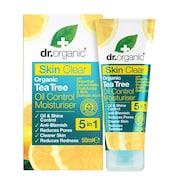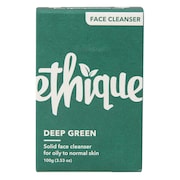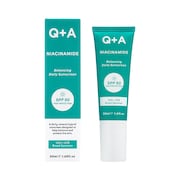15% off €25
Code:SPEND
Say goodbye to shine: how to stop oily skin in its tracks

Believe it or not, oily skin deserves a glow-up – so we share our shine-balancing secrets and cleansers, moisturisers and SPF to keep your skin radiant, not greasy
Our top skin care products for oily skin types
Anti-blemish

Dr Organic
Dr Organic Skin Clear Oil Control Moisturiser 50ml
25% off
€7.86
€10.49
Super gentle, yet effective

Ethique
Ethique Deep Green - Solid face cleanser for balanced to oily skin 100g
Buy 1 Get 1 Half Price
€18.99
Fast-absorbing and non-greasy

Q+A
Q+A Niacinamide SPF50 Balancing Daily Facial Sunscreen 50ml
€19.50
Oily skin has been misunderstood for too long. Say it with us: it needs moisture!
We’ll bust the myths and help you control shine and blemishes without that too-tight feeling. And stay tuned for our oil-friendly moisturiser, cleanser and sun care picks...
What causes oily skin?
Oil isn’t a bad thing – our skin needs it to stay hydrated and protected. But an excess could leave you with pimples or just a shine you didn't plan on.
If you’ve got oily skin, chances are your skin has overactive sebaceous glands (which secrete sebum, the skin’s natural oil). This could be down to:1,2
Do I have oily skin?
Signs include a shiny face (especially around the ‘T-zone’), enlarged pores and being prone to breakouts and pimples.
If some sections of your skin are oily and others are dry, you have ‘combination skin’ instead.
How to look after oily skin

If you’re going through blotting papers like there’s no tomorrow or are always waiting for a new blemish to turn up uninvited, you’re probably wondering what’s going on (and you’re not alone).
There’s no failsafe method that’ll transform your skin, but a few changes to your skincare and lifestyle could make all the difference...
- Rinse with lukewarm water
If you use hot water to wash your face, stop now. Hot water dries the skin out, actually leading to more oil being produced to replace it.
Try using slightly cooler water when washing and turn down the heat a little when showering. But continue to wash your face twice a day (and more if you exercise). - Use oils (and moisturise)
Yes, really. It might sound counterintuitive, but adding oil products to oily skin may help it calm down.
Your skin produces more oil because it needs the moisture. Keeping it ‘dry’ will only tell your skin that it needs to be oilier.
On that note, don’t skip moisturiser. Et voilà: chilled-out sebaceous glands. - Scrub gently
You can still use exfoliants on your skin but be super careful with what type and how much pressure you apply.
Your face is delicate and should be treated with love and affection. Pick a scrub suitable for oily skin (this one’s good for all types – even if you have oily skin or a combo) and gently massage it in using slow, circular movements. - Choose skincare carefully
While it might be tempting to strip your skin dry, don’t.
Avoid harsh exfoliants and grainy scrubs, as well as alcohol-based products. These might feel like they’re helping at first, but they could dehydrate your skin (and potentially make it even oilier, as we learned before).
Instead, choose non-comedogenic products – this means they won’t clog pores and contribute to more blemishes. Look for products that say they’re specifically made for oily skin too.
Salicylic acid might be a good choice, as it’s a type of beta hydroxy acid (BHA) which helps dissolve excess oil. It also breaks dead skin cells apart, meaning your pores are less likely to clog.3 - …and choose your makeup wisely
Does makeup break you out? Look for non-comedogenic products as they’ll avoid clogging your pores.
Or maybe the issue’s the dreaded slide. If everything slips off after a few hours, try a primer with a stickier texture and go hard on the setting spray, applying after every stage in your makeup routine. Dab translucent powder on your oiliest parts to gently mattify without ending up cakey.
Glow lovers, don’t worry – you can choose a setting spray for oily skin that fixes your makeup and still helps you look dewy, so it doesn’t mean you’ll end up super matte.
And if you find foundation just doesn’t sit right on you, there’s no harm in choosing a tinted moisturiser or BB cream instead. - Check in on your diet
If you’re failing to see an improvement, it could be that the issue goes deeper. Hormonal balance may contribute to oily skin, so pay attention to patterns in your routine (like your period or changes in the way you eat).
It’s not strictly true that eating ‘junk food’ makes your skin oily (despite the unsolicited advice you might have had in the past). It’s more that excessive sugar may contribute to inflammation in the body, which might then take a toll on your skin.4,5
Instead, cut back on these foods where you can and include plenty of fruit, veg and whole grains as well. Want to learn more? Check out our guide to hormone health and diet here. - Get a sweat on
Who knew there’s a relationship between exercise and your skin?
Part of it’s due to your lifestyle – chances are you sleep better, drink more, experience less stress and spend more time in nature if you’re regularly active.
But any kind of exercise gets blood flowing around the body – including the skin – which gives you that healthy glow.6
Just be sure to rinse off once you’re done, as excess sweat could contribute to congested skin. - Make sleep a priority
Is ‘beauty sleep’ a real thing? Actually, yes.
Among many other things, sleep helps regulate our hormone balance and keep our cortisol (stress hormone) levels down.7
Some research has even linked a later bedtime to decreased skin hydration and an increase in oil production.8,9
Everyone needs a different amount, but aim for seven to nine hours of good ZZZs per night.10
Our top skincare products for oily skin types
Rule number one: oily skin still needs hydration.
Dr Organic comes to the rescue with their daily moisturiser, starring salicylic acid, cucumber extract, willow bark extract and more.
The key word here is ‘control’: this moisturiser nourishes the skin without clogging and helps limit excess oil without stripping skin dry. Even better, it’s suitable for vegans.
Face cleanser for oily skin
Ethique’s a champ when it comes to convenience: this face cleanser bar couldn’t be simpler to pack on the go (and it saves on plastic bottles too).
Deep Green is suited to oily and blemish-prone skin, using sweet orange oil and Kaolin clay to gently lift excess oil without drying skin out.
Just lather the bar between wet hands and apply to a damp face. Massage and rinse with warm (not hot) water.
Sunscreen for oily skin
One of three in Q+A’s new sunscreen range, this SPF50 shields against sun damage and contains niacinamide and soothing aloe vera.
It provides broad-spectrum UVA and UVB protection, while helping to target oiliness and promote a balanced complexion.11,12
Smooth over clean skin every morning and enjoy its lightweight, non-greasy finish.
The final say
Things looking clearer? Oily skin doesn’t have to be a curse – it just works a little too hard. Be sure to rule out the other factors (like stress) we spoke about too, and speak to a dermatologist if you’re still concerned.
We hope our picks and tips bring a little balance into your life... and why not discover one reader’s salicylic acid success story next?
This article provides informational advice and is not a substitute for medical care. Curated by experts for accuracy, we take great care to ensure the information is up-to-date and relevant. However, you should always consult your GP or healthcare professional before using supplements or alternative products, particularly if you have medical conditions or are under supervision.
1. NHS. Overview – Acne [Internet]. NHS [reviewed 2023 Jan 3; cited 2025 Apr 15]. Available from: https://www.nhs.uk/conditions/acne/
2. NHS Inform. Acne [Internet]. NHS Inform [reviewed 2025 Feb 13; cited 2025 Apr 15]. Available from: https://www.nhsinform.scot/illnesses-and-conditions/skin-hair-and-nails/acne/
3. Măgeruşan SE, Hancu G, Rusu A. A Comprehensive Bibliographic Review Concerning the Efficacy of Organic Acids for Chemical Peels Treating Acne Vulgaris. Molecules [Internet]. 2023 Oct 22 [cited 2025 Feb 10]; 28(20): 7219. Available from: https://pmc.ncbi.nlm.nih.gov/articles/PMC10608815/
4. Ma X et al. Excessive intake of sugar: an accomplice of inflammation. Front Immunol [Internet]. 2022 Aug 31 [cited 2025 Apr 15]; 13. Available from: https://pmc.ncbi.nlm.nih.gov/articles/PMC9471313/
5. American Academy of Dermatology (AAD). Can the right diet get rid of acne? [Internet]. AAD [cited 2025 Apr 15]. Available from: https://www.aad.org/public/diseases/acne/causes/diet
6. Oizumi R, Sugimoto Y, Aibara H. The Potential of Exercise on Lifestyle and Skin Function: Narrative Review. JMIR Dermatol [Internet]. 2024 Mar 14 [cited 2025 Apr 15]. Available from: https://pmc.ncbi.nlm.nih.gov/articles/PMC10979338/
7. Nollet M, Wisden W, Franks NP. Sleep deprivation and stress: a reciprocal relationship. Interface Focus [Internet]. 2020 Jun 6 [cited 2025 Apr 15]; 10(3). Available from: https://pubmed.ncbi.nlm.nih.gov/32382403/
8. Shao L et al. Regular Late Bedtime Significantly Affects the Skin Physiological Characteristics and Skin Bacterial Microbiome. Clin Cosmet Investig Dermatol [Internet]. 2022 Jun 7 [cited 2025 Apr 15]; 15: 1051-63. Available from: https://pubmed.ncbi.nlm.nih.gov/35698548/
9. UpToDate. Pathogenesis, clinical manifestations, and diagnosis of acne vulgaris [Internet]. UpToDate [reviewed 2024 Jul 2; cited 2025 Apr 15]. Available from: https://www.uptodate.com/contents/pathogenesis-clinical-manifestations-and-diagnosis-of-acne-vulgaris
10. NHS. Sleep problems [Internet]. NHS [cited 2025 Apr 15]. Available from: https://www.nhs.uk/every-mind-matters/mental-health-issues/sleep/
11. Gehring W. Nicotinic acid/niacinamide and the skin. J Cosmet Dermatol [Internet]. 2004 Apr [cited 2025 Apr 15]; 3(2): 88-93. Available from: https://pubmed.ncbi.nlm.nih.gov/17147561/
12. Marques C et al. Mechanistic Insights into the Multiple Functions of Niacinamide: Therapeutic Implications and Cosmeceutical Applications in Functional Skincare Products. Antioxidants (Basel) [Internet]. 2024 Mar 30 [cited 2025 Apr 15]; 13(4): 425. Available from: https://pmc.ncbi.nlm.nih.gov/articles/PMC11047333/







